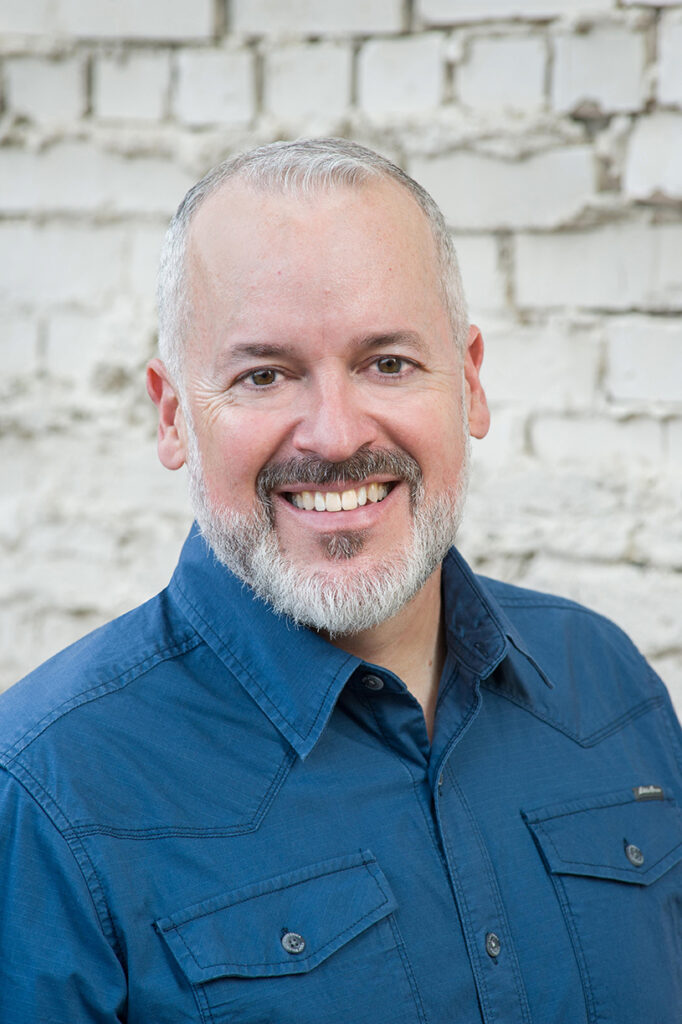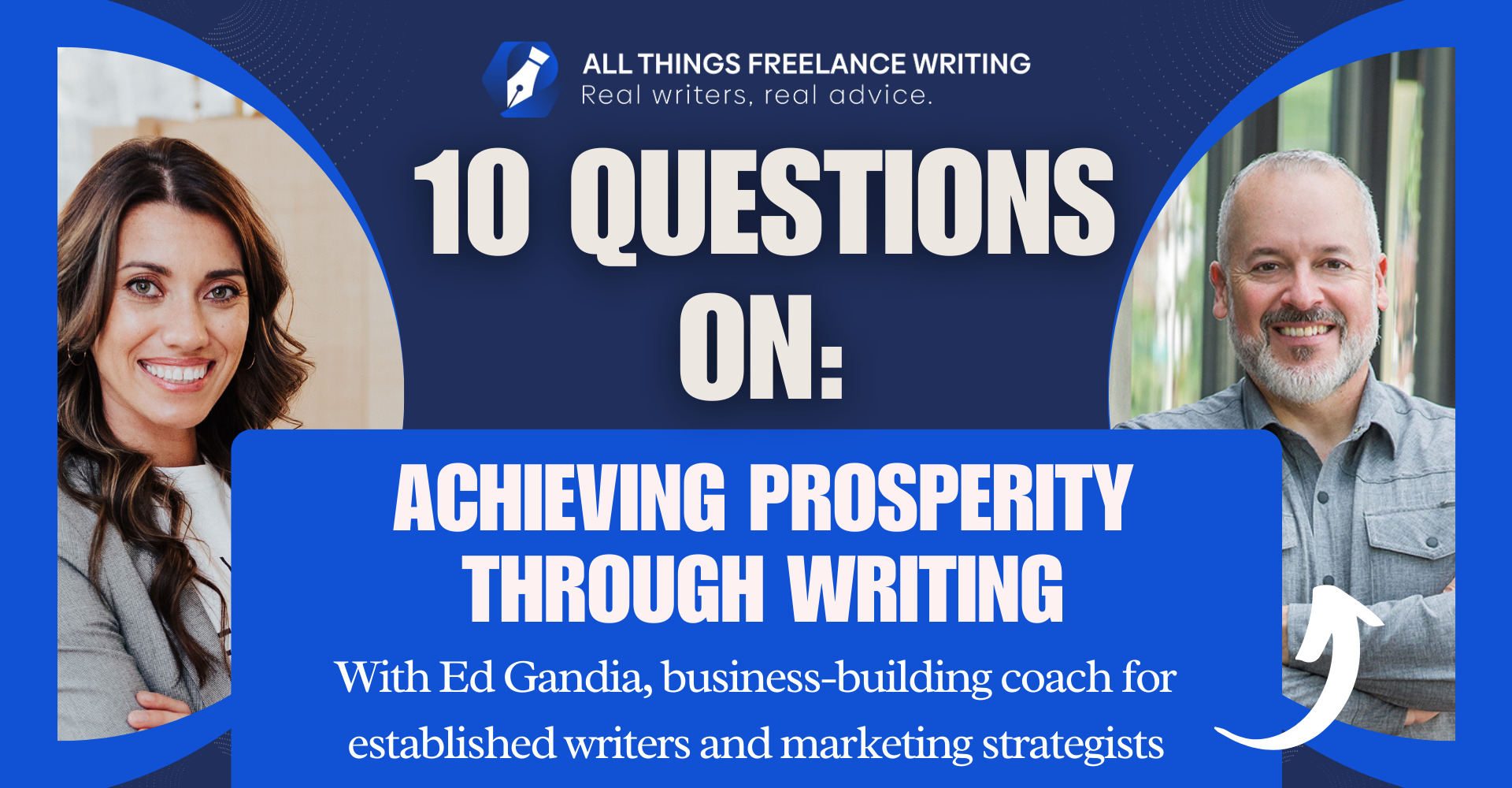Ed Gandia, a business-building coach for freelance writers and marketing strategists, shares how you can achieve prosperity through a freelance writing business.
- When did you start freelance writing? 21 years ago
- Where are you from? Roswell, Georgia, U.S
1. After coaching more than 1,100 freelance professionals, what would you say is the key to achieving real prosperity as a freelance writer?
Without a doubt, it’s treating what you do as a real business. Most freelance writers don’t know they’re running a business. And just as many don’t want to think of it as a business. They see it as a craft, a profession, a calling. Or they act as employees or workers for hire.
That doesn’t work today—not if you want to prosper. The world has changed. Journalism continues its downward trajectory, which is only accelerating. You have to treat it and think of it as a business if you want to do well. And there’s an operational component to that as well as a big mindset component. Both are crucial.
“You have to treat it and think of it as a business if you want to do well.”
Ed Gandia
2. For freelance writers who are struggling to keep faith that they can indeed go from where they are now to a place where they feel prosperous, what advice would you offer? What helped you?

Two things. First, look at how you’re positioning yourself in the marketplace. Are you speaking to one audience, and are you making it clear what value you offer them and what makes you different from most?
Along those lines, is that an audience that’s “hungry” for the type of writing and marketing work you offer? By that I mean, do they find enough strategic value in the types of projects you help clients with because it helps them achieve their objectives? If the answer is yes, then that’s a market that’s typically willing to pay professional-level fees for content and copy. That’s where you want to be.
For example, basic healthcare and wellness content for a general consumer audience may not command the kinds of fees that content and copy for a medical device manufacturer would. The medical device company needs that content to help sell very expensive equipment, whereas a health and wellness blog may generate very little (if any) revenue from publishing much of its content.
Second, you need smart and steady marketing execution. If I had to name one reason why freelancers fail is that they do not market effectively or consistently. I’m not trying to make anyone feel bad. I fell into the same trap myself. You’re tired or too busy with client work, so you put off the marketing. But then your pipeline dries up, and before you know it you’re desperate and hustling like mad to land anything. That’s not a good place to be, and it’s not sustainable.
3. If writers are building momentum and then hit a famine where everything seems to be going wrong, what should they do? Is that normal?
If your work pipeline has dried up, prospecting must be a BIG part of your week. To be more specific, if you dedicate, say, 30 hours per week to your business … and you currently have only 10 hours of client work per week … prospecting MUST take up the other 20 hours.
OK, scratch that. Take 5 of those hours to do some fun things you’ve been putting off because you’ve been crazy-busy over the past 3 years. Jump back on that novel you started writing last year. Do some volunteer work. Or take an afternoon off to go fishing, hiking, or hang out with your kids. You deserve that, for sure.
But the other 15 hours? Prospecting. And more prospecting. And lots and lots of follow-up and touching base. And reaching out to all current, past, and dormant clients to see if you can help them (you’d be surprised what can come out of that, even with really old clients!).
Until your pipeline is full and the work is filling up most of your workweek, prospecting must be your biggest “client.” Period. Is it hard? Will you face rejection? Will get radio silence from a lot of people? Yes, yes, and yes. But this is what we signed up for. There’s no free lunch.
“Until your pipeline is full and the work is filling up most of your workweek, prospecting must be your biggest ‘client.'”
Ed Gandia
4. Running a business can be an exhausting emotional rollercoaster. Do you have advice on managing the emotional component so it doesn’t drain writers?

Yes, there are 3 things I recommend.
- First, start a journaling practice. Write about what you’re facing every single morning, even if it’s just 10 minutes per day. Just pour the thoughts and frustrations (and wins, too!) onto the page. Don’t edit yourself. No one is going to read this but you.
- Second, take up a creative practice. Start drawing, painting, crocheting, woodworking, collaging—anything. You don’t have to be good at it. And here again, no one needs to see your work. In fact, I recommend you don’t show it to anyone. You’re not doing it for praise and recognition. You’re doing it as an act of self-love.
- Third, talk to someone about your frustrations. Find a friend, colleague, partner, coach, or mentor. Someone who can create a safe space for you to vent and talk through the good, the bad, and the ugly sides of your business. It’s so cathartic to be able to express our thoughts and feelings to others.
5. If freelancers are ready to commit to earning more in less time, what’s the first thing they should do?
Once you’ve examined and optimized your positioning, start going after better clients in hungrier markets who “get” it. Yes, it will be scary. But scary is good. We all have to get comfortable feeling uncomfortable to succeed in this business. And offering higher-paying projects to higher-paying clients with bigger budgets is a key part of this.
Along those lines, a great exercise to try is to quote 20% higher to the next prospect you talk to. So if you would normally quote, say, $1,000 for that article or deliverable, quote $1,200 instead and see what they say.
I’ve found that more than 50% of the time you’ll still get a yes! The win here is not about the additional income. It’s about the person you’re becoming when you push yourself like this. It’s the increased confidence—the new normal you’re creating with your fees. That’s powerful and worth way more than the extra $200 in this example.
“Yes, it will be scary. But scary is good. We all have to get comfortable feeling uncomfortable to succeed in this business.”
Ed Gandia
6. You’ve shared about the importance of positioning to stand out as a freelance writer in today’s tough market. How can writers figure out how they should position themselves?

Teryl Jackson photography
I walk coaching clients through a multi-step process with multiple questions and prompts to help them decide. But in a nutshell, you need to answer the following:
- What do I do? What do I offer clients?
- Whom can I best serve? This does NOT need to be an industry. You can describe your target audience using other attributes.
- What makes me different from most other writers outside of my writing ability?
- Why would those differences matter to my chosen target audience? Why would they care?
Brainstorm answers to all these questions. Don’t prejudge. Just see what comes out. You can edit and consolidate later. And once you’ve narrowed your answers down to your best few options, partner up with a colleague to get their feedback.
This is really hard to do for yourself. We all have blind spots. So having another perspective is really helpful. Someone else will see things you don’t see and will likely have some suggestions or reframing you hadn’t considered.
7. How do you recommend writers go about finding/attracting their ideal clients in 2024? Are there any methods/ways you see working best right now?
Once you know whom you’re going after, look for companies and organizations that are already creating the kind of copy, content, and deliverables you want to do more of. It’s counterintuitive, but you’re much better off going after prospects who are already doing a lot of that work than to try and convince others they should start doing it.
Rolex doesn’t market to people like me who don’t wear a watch. They market to people who love expensive watches and already own 3 or 4 of them. Williams Sonoma doesn’t market to people who hate to cook. They don’t bother trying to convince those folks to take up cooking. Instead, they market to people who already have a beautiful set of knives and pots and pans. Why? Because those people will buy even more of those things. It’s the same with copy and content marketing.
“Rolex doesn’t market to people like me who don’t wear a watch. They market to people who love expensive watches and already own 3 or 4 of them…Why? Because those people will buy even more of those things. It’s the same with copy and content marketing.”
Ed Gandia
8. And can you share a bit about how/when you got into freelance writing?

My writing career was born out of necessity. In 2003 I was selling software for a small company with a very limited marketing budget. I had to find my own sales leads, which was nothing new. I faced the same challenge with my last two employers.
In an effort to find solutions to this challenge, I had learned how to write effective lead-generating letters by reading books and taking courses on the subject. I used all this information to write and mail lead-generating letters and fax broadcasting campaigns (back when it was legal to do so). This stuff worked! It generated appointments that eventually turned into sales and sales commissions for me.
It didn’t take me long to figure out that this was something I could do for a living. I thought of it as “selling on paper,” rather than selling in person. And it offered something that was very important to me: the ability to avoid weekly travel as a sales rep.
Once I made the decision to launch a side hustle, it took me 27 months of hard work to build enough savings and momentum to quit my day job. My first day of self-employment came on June 1, 2006, and I’ve never looked back!
“Once I made the decision to launch a side hustle, it took me 27 months of hard work to build enough savings and momentum to quit my day job.”
Ed Gandia
9. What do you do/offer today?
I was a full-time freelance copywriter and content writer for 6 years. But during that time I also launched a few courses to help new and aspiring writers launch and grow their business faster and with less risk. I wanted to teach the lessons I had learned along the way, and I did this as a side hustle for several years.
Most of my income still came from writing clients. Then in 2012, I started transitioning into coaching other writers on the business side of things. And over the next 4 years, I gradually let go of my writing clients. By then I knew that coaching and teaching was where I wanted to go.
These days my sole focus is coaching writers and teaching workshops to help writers, copywriters, and solo marketers earn more in less time doing work they love for better clients.
10. Lastly, what are you planning for 2024? What should we should keep an eye out for?
I’m excited about my new business-building toolkit, which is essentially a set of tightly focused trainings to help writers with their biggest business problems.
This is training I used to reserve for coaching clients only. But last year I started offering these sessions individually (or as a full toolkit) for a super-affordable fee. I want more writers to have access to these highly practical tools, systems, formulas, and checklists that have already helped so many.
I’m also going to be much more focused on creating new resources and services to help established writers land more and better-paying clients. Part of this will be a completely new experiment I’m hoping to launch in Q2. Can’t say much other than it’s something totally different and I’m really excited about it.
Where can you find, follow, and learn from Ed?
- His website
- Download his free PDF guide: 101 Productive Ways to Work ON Your Business
Thank you, Ed, for sharing your insights with the ATFW community!


